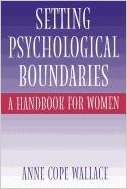 |  | Setting Psychological Boundaries: A Handbook for Women
Author: 0
Publisher: Praeger (October 30, 1997)
Paperback: 224 pages
ISBN-10: 0313360707
ISBN-13: 978-0313360701


|
This book contains stories of women of all different ages and backgrounds, along with their family histories. It's interesting to see how dysfunctional patterns can be traced back for generations, and each person is in a different stage of recovery. Some are still struggling, but many have done very well in life in spite of their pasts, giving hope to the reader. There is some excellent poetery sprinkled throughout the book, and we can see what each person is working on (for example asserting herself, resolving issues from the past, living in the present, relationship building, self-esteem and identity building, etc.) This book would be a valuable resource for someone studying psychology (and for those far along in recovery); however,
I'd like to warn our members that there might be some triggering scenarios within this book. I frequently visit the coping with parents/relatives board & this is one of my favorite quotes from Setting Psychological Boundaries (p.107):
"Why should we have to forgive ourseves when we, the victims, have done nothing shameful or hurtful? Because we, as abused or neglected children, have learned our lesson well. We have been taught that we are to blame for whatever has gone wrong in a parent's life. If it weren't for us Mother would be a ballet dancer or concert pianist; Dad would be president of a multimillion-dollar corporation; there would be no financial problems, no arguements, no fights. We have ruined everything for our parents and must be held accountable. If they didn't have us to blame, they might have to take a good look at the chaos of their own lives and actions and how disconcerting, how terrible that would be."




 Poll
Poll
